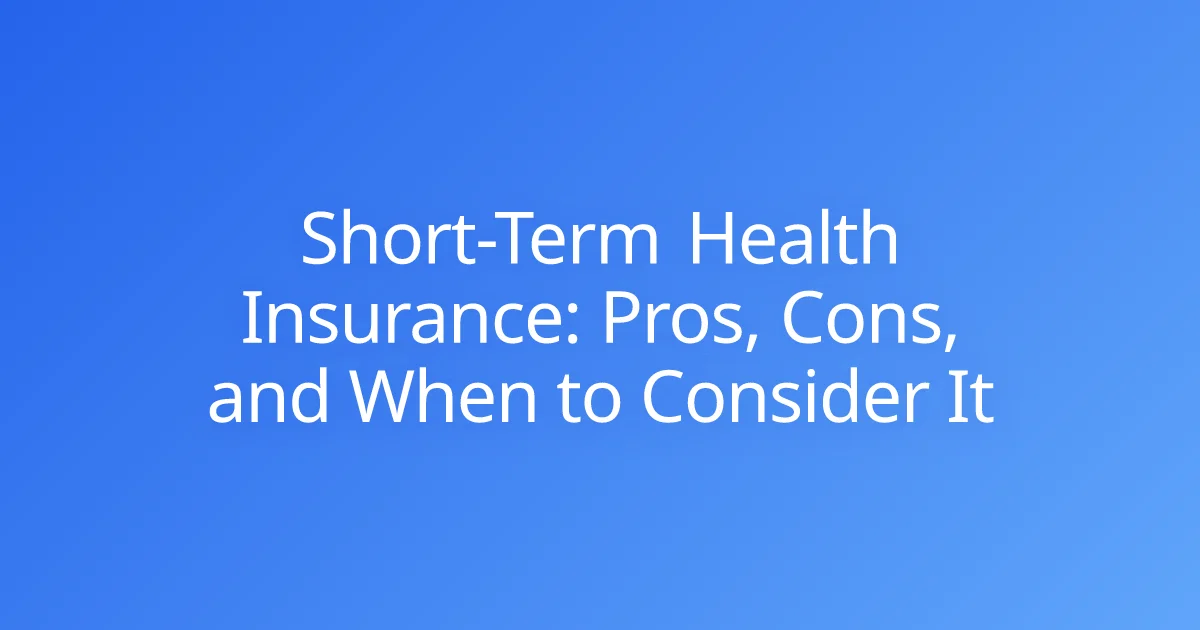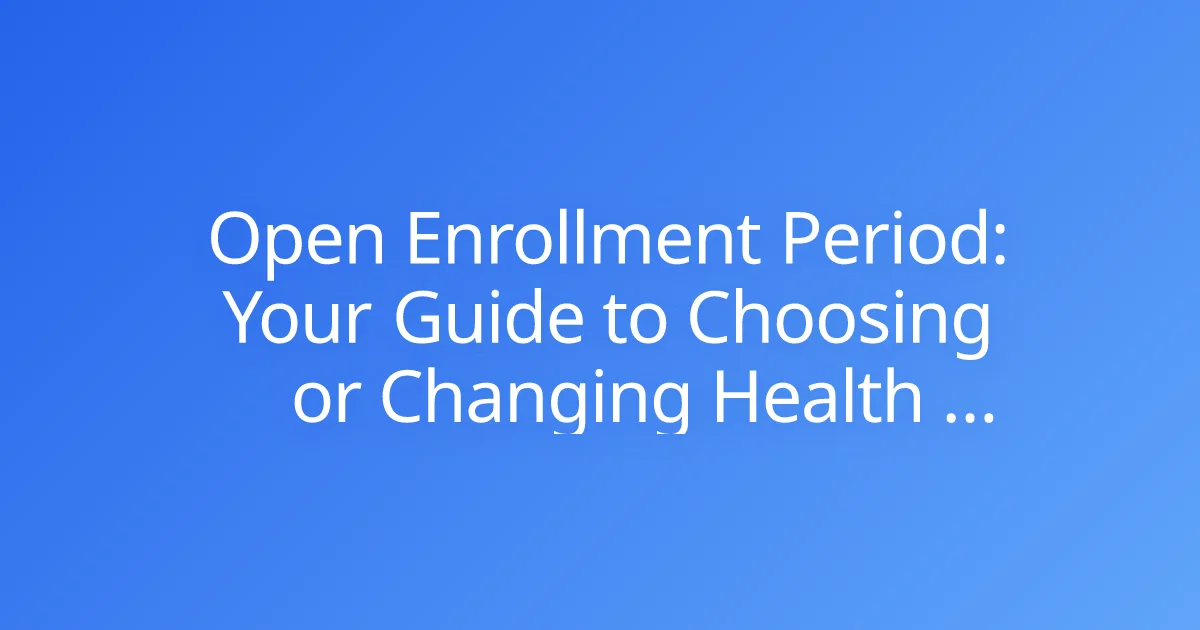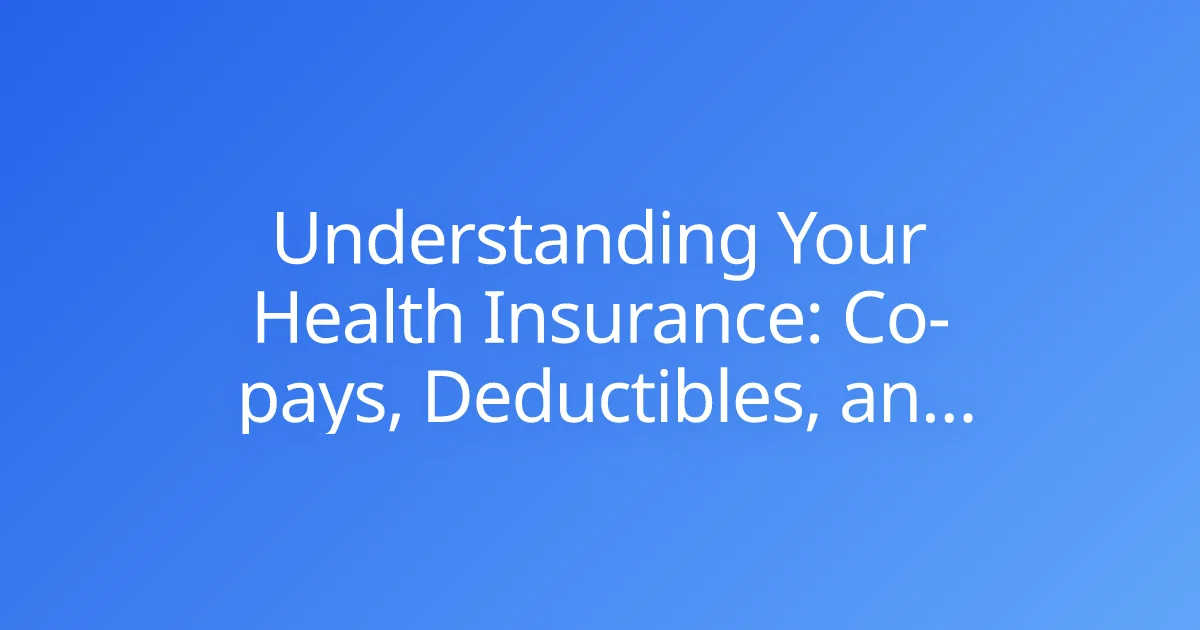Short-Term Health Insurance: Pros, Cons, and When to Consider It
Life is full of transitions. Whether you're between jobs, fresh out of college, or waiting for your Medicare to begin, you might find yourself in a coverage gap, feeling vulnerable to the high cost of an unexpected medical emergency. In these moments, the term short-term health insurance often emerges as a potential solution. But what is it, really? Is it a reliable safety net or a risky gamble?
This guide is designed to provide a clear, balanced, and expert breakdown of temporary medical insurance. We will dive deep into the pros and cons of short-term health insurance, demystifying its purpose and its significant limitations. By the end of this article, you will have the knowledge to determine if this type of gap coverage is a responsible choice for your specific circumstances.
What Exactly Is Short-Term Health Insurance?
Before weighing the pros and cons, it's crucial to understand the fundamental nature of these plans. Short-term health insurance is a type of temporary medical policy designed to provide catastrophic coverage for a limited period, typically from 30 days to just under a year, depending on state regulations.
Think of it as a bare-bones safety net intended to protect you from the financial devastation of a sudden, major illness or injury. It is not a substitute for comprehensive, major medical insurance.
How It Differs from Major Medical (ACA) Plans
The most significant distinction is that short-term health insurance plans are not compliant with the Affordable Care Act (ACA). This is a critical point that creates major differences in coverage, cost, and accessibility.
Here’s a direct comparison:
| Feature | Short-Term Health Insurance | Major Medical (ACA) Plan |
|---|---|---|
| Pre-existing Conditions | Not covered. Insurers can deny claims or coverage based on your health history. | Covered. Cannot be denied coverage or charged more due to a pre-existing condition. |
| Essential Health Benefits | Not required to cover. Often excludes maternity care, mental health, preventive care, and prescription drugs. | Must cover the 10 essential health benefits, including these critical services. |
| Application Process | Involves medical underwriting. You must answer health questions and can be denied. | Open enrollment or Special Enrollment Period. You cannot be denied based on health status. |
| Policy Duration | Temporary, with limited terms (e.g., up to 364 days). Renewal is not guaranteed. | Typically annual. Guaranteed renewable as long as you pay premiums. |
| Premiums | Generally lower. | Generally higher. |
| Out-of-Pocket Costs | Can have very high deductibles and cost-sharing, with potential coverage caps. | Out-of-pocket maximums are capped by law. |
The Pros of Short-Term Health Insurance (The Upside)
While the limitations are significant, there are specific reasons why someone might find a short-term plan appealing.
Pro: Speed and Flexibility
One of the biggest advantages is the speed of enrollment. Unlike ACA plans, which are tied to specific enrollment periods, you can apply for a short-term plan at any time. The application is often simple, and if approved, your coverage can begin as soon as the next day. This makes it an effective solution for bridging an unexpected and immediate coverage gap.
Pro: Lower Premiums
Because these plans cover far less and take on less risk, their monthly premiums are significantly lower than those of ACA-compliant plans. For a young, healthy individual who primarily wants protection against a catastrophic accident, this low monthly cost can be very attractive.
Pro: Customizable Durations
You can often tailor the coverage period to your specific needs. If you only need insurance for two months while you wait for a new employer’s plan to start, you can purchase a policy for that exact duration. This avoids paying for more coverage than you need.
The Cons of Short-Term Health Insurance (The Significant Downsides)
It is absolutely critical to understand the risks and drawbacks associated with these plans. For many people, the cons will far outweigh the pros.
Con: No Coverage for Pre-existing Conditions
This is the single most important limitation. Short-term insurance plans use medical underwriting to screen applicants. They will not cover any health issue you had before the policy started. This includes conditions like diabetes, heart disease, cancer, asthma, and even a past injury that could flare up again. Insurers can and will investigate your medical history when you file a claim and deny payment if they link the issue to a pre-existing condition.
Real-World Example: Imagine you buy a short-term plan and three months later have a severe asthma attack that requires hospitalization. If your medical records show you've ever been treated for asthma, the insurer will likely deny the entire claim, leaving you with the full hospital bill.
Con: Limited Coverage and Major Exclusions
These plans are exempt from the ACA’s mandate to cover 10 essential health benefits. This means you will likely find no coverage for many common healthcare needs, including:
- Maternity and newborn care
- Mental health and substance use disorder services
- Preventive care (e.g., annual check-ups, cancer screenings, vaccinations)
- Prescription drugs (or very limited, high-cost coverage)
Con: High Out-of-Pocket Costs
While the premiums are low, the financial exposure can be immense. Short-term plans often come with very high deductibles and coinsurance. A deductible of $10,000 or more is not uncommon. Furthermore, some plans have annual or lifetime coverage maximums, meaning the insurer will stop paying once your costs reach a certain limit (e.g., $250,000 or $1 million), leaving you responsible for any bills beyond that.
Con: No Guaranteed Renewability
When your short-term policy's term ends, there is no guarantee you can get another one. You must re-apply and go through medical underwriting again. If you developed a health condition—like high blood pressure or even just a sports injury—during your previous term, that condition is now considered "pre-existing," and your application for a new short-term plan could be denied.
When to Consider Short-Term Health Insurance: Specific Scenarios
Given the significant risks, these plans are only appropriate for a very narrow set of circumstances and for a specific type of person: a healthy individual who needs a temporary, catastrophic-only safety net.
Consider it only in these specific gap situations:
- Between Jobs: You have a confirmed start date for a new job with benefits but have a gap of one to three months.
- Waiting for Open Enrollment: You missed the ACA open enrollment period and do not qualify for a Special Enrollment Period to buy a major medical plan.
- Aging Off a Parent’s Plan: You are turning 26 and need coverage for a few months before your own employer-sponsored or individual plan begins.
- Waiting for Medicare: You retired at 64 and need to bridge the final few months until your Medicare eligibility begins at age 65.
- Recent Graduate: You've just graduated and are job hunting, needing a temporary stopgap.
In all these cases, the assumption is that you are in excellent health with no pre-existing conditions and are simply seeking protection from a new, unforeseen, and major medical event.
Key Questions to Ask Before Buying a Short-Term Plan
If you believe a short-term plan is your only viable option, you must act as an informed consumer. Arm yourself with these critical questions when speaking to an agent or reviewing policy documents:
- Exclusions List: Can I see a complete list of excluded services and conditions?
- Pre-existing Condition Definition: How does this policy define a "pre-existing condition"? What is the "look-back period" the insurer uses to review my medical history?
- Out-of-Pocket Costs: What is the exact deductible, coinsurance percentage, and the absolute out-of-pocket maximum?
- Coverage Caps: Are there any annual or lifetime limits on what the policy will pay?
- Prescription Drugs: Is there any coverage for prescription drugs? If so, what is the formulary (list of covered drugs) and the cost-sharing structure?
- Provider Network: Is this an HMO or PPO network? Are my local hospitals and preferred doctors in-network?
- Renewal Policy: Can this policy be renewed? If so, for how long and under what conditions?
Conclusion
Short-term health insurance exists for a reason, but it is a niche product with serious limitations. It serves best as a last-resort, temporary bridge for healthy individuals who understand they are forgoing comprehensive coverage in exchange for low premiums and protection from a true catastrophe. The low price tag is tempting, but it comes with significant risk and massive gaps in coverage for things like pre-existing conditions, preventive care, and mental health.
By understanding the clear pros and the very serious cons, you are now better equipped to analyze your own situation. You can weigh the immediate cost savings against the potential for financial disaster and make a decision that truly aligns with your health needs and financial security.
Making the right choice about gap coverage can be tricky. What are your biggest concerns when facing a period without health insurance?



